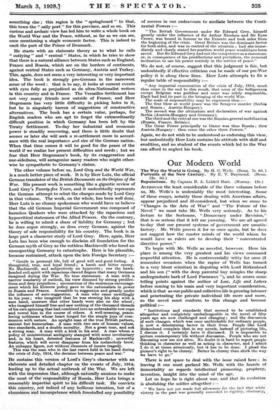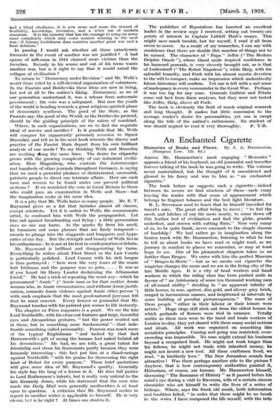Our Modern World
Reputations. By Captain B. A. Liddell Hart. (Murray. 12s.)
ALTHOUGH the least considerable of the three volumes before us, Mr. Wells's is undeniably the most -interesting. Some
of these essays, notably those dealing with American affairs, appear prejudiced and ill-considered, 'but when we come to "Changes in the Arts of War" and "The Future of the Novel " we must take Mr. Wells very seriously. As to his lecture to the Sorbonne, " Democracy under Revision,"
that is so serious that it left me yawning. We are all agreed. to-day that our present systems of government are unsatis-: factory. Mr. Wells proves it for us once again, but he does . not suggest how the master minds of the world whom he would have as rulers are to develop their " concentrated
directive power."
To begin with Mr. Wells as novelist, however. Here his place is . among the very greatest and his views.. command.
respectful attention. He is controversially witty for once (I remember occasions when the rapier of Wells has turned to a very blunt scimitar) in disputing with Lord Birkenhead and his son (" with the deep parental bay mingles the sharp undergraduate bark of Lord Furneaux "), and he scores some telling points against the author of Law, Life and. Letters before coming to his main and very important consideration,
which is that as our public and collective life is growing intenser and penetrating the private individual life more and more, so the novel must conform to this change and become political :—
" Institutions and standards that seemed to be established altogether and completely unahallengeable in the novel of fifty years ago are now challenged and changing ; and the discussion of such changes, which was once unthinkable for ordinary people, is now a determining factor in their, lives. People like Lord Birkenhead complain that in my novels, instead of picturing life. I discuss it. I certainly have it discussed. It is impossible to picture contemporary life without discussion. People who are not discussing now are not alive. No doubt it is hard to report people thinking in character as well as acting in character, and I admit I do it at times atrociously, but it has to be done. I plead the pioneer's right to be clumsy. Better be clumsy than shirk the way
we have to go." ,
There is not space to deal with the issue raised here : in leaving it one must garland Mr. Wells with the laurels of immortality as regards intellectual pioneering, prophecy, invention, insight into the mind of the age. Let us hope ,he is right about war, and that its evolution is abolishing the soldier altogether` .
" We have not yet made full allowance for the fact that while victory in' the past was generally conceded to rigidity, obstinacy,
and a blind obedience, it is now more and more the reward of flexibility, knowledge, invention, and a witty use of modern resources. It is the country that has the courage to scrap its army most completely which may come nearest winning in the next war—if human foolishness does contrive another great war and a final delirium."
- In passing I would ask whether all these cataclysmic forecasts in the event of another war are justified ? A bad spasm of influenza in 1918 claimed more victims than the trenches. Nobody in his senses and out of his teens wants another war, but is it right to say that it would entail the collapse of civilization ?
To return to " Democracy under Revision " and Mr. Wells's world State ruled by a self-devoted organization of volunteers. In the Fascists and Bolsheviks these ideas are now in being,
but not at all to the author's liking. Democracy, as we of our generation understand it, was a release from autocratic government : the vote was a safeguard. But now the youth of the world is heading towards a great religious-spirited phase of democratic synthesis. The good of the State, as the Fascists say, the good of the World, as the Bolsheviks pretend, should be the guiding principle of the rulers of mankind.
Where, in such organizations, are we to find the requisite ideal of service and sacrifice ? Is it possible that Mr. Wells will conquer his (apparently personal) aversion to Signor Mussolini, and tell us in his next book wherein the theory and practice of the Fascist State depart from his own brilliant analysis of our needs ? To my thinking Wells and Mussolini are working song the same lines. The desire for oligarchy grows with the growing complexity of our industrial civiliz- ation. Herr .Hugenberg, who controls the Lokalanzeiger and hundreds of other journals throughout Germany, is saying
that we need a powerful phalanx of disinterested, successful, patriotic people to direct our intricate affairs. How are such
men and women to be found under our present political systems ? If we restricted the vote in Great Britain to those who could pass an examination in Wells and Shaw—but the imagination rocks at the mere idea.
It is a pity that Mr. Wells hates so many people. Mr. E. T.
Raymond gives us a list that includes almost all classes, except scientists. Yet it is unfair to Wells, the consummate artist, to confound him with Wells the propagandist. Let him rail against broadcasting and flying : a little persecution does no one any harm. As the sparks fly from his anvil, he hammers out some phrases that are finely tempered— swords to plunge into the sluggards and braggarts and hypo- crites of our day. But the strength and beauty of Wells lies in his enthusiasms : he is not at his best in condemnation or debate. Mr. Raymond is brilliant and disappointing by turns. Everything he writes about Fleet Street or the Law Courts is particularly polished. Lord Carson with his rich brogue is thus portrayed : " here were the very tones of the music hall Irishman and the purpose was so grim. . . . It was as if you heard Sir Harry Lauder declaiming the Athanasian Creed." He had a trick of repeating the word any—which he pronounced " Annie " (" Annie man or for that matter Annie woman who, in Annie circumstances, and without Annie justifi- cation, commits Annie violence against Annie other person ") With such emphasis that the most good-natured juryman felt that he must convict. Every lawyer or journalist that Mr.
Raymond touches with his pointed pen comes to life instantly. The chapter on Press magnates is a pearl. We see the late Lord Northcliffe, with his clear-cut features and large, beautiful eyes and Alexandrian gestures, " but the power resided not in these, but in something more fundamental "—that inde- finable something called personality. Pearson was much more of the typical Englishman " and • lacked by that fact Harmsworth's gift of seeing the human fool naked behind all his decorations." He had, we are told, a great talent for friendship and chose his lieutenants partly because they were humanly interesting : this fact put him at a disadvantage against Northcliffe " with his genius for discovering the right kind of Robot for every purpose." These brief quotations will give some idea of Mr. Raymond's quality. Generally his style has the tang of a lemon in it. He does full justice to Lord Rothermere's talents, but is really very unkind to the late Kennedy Jones, while his statement that the men who made the Daily Mail were generally mediocrities is at least open to question. A criticism that Mr. Raymond makes in regard to another writer is applicable to himself. He is very
clever, but is he right ? At times one doubts it. • The publisher of Reputations has inserted an excellent leaflet in the review copy I received, setting out twenty-six points of interest in Captain Liddell Hart's essays. This might save much trouble, but for myself, I read it all from cover to cover. As a result of my researches, I can say with confidence that there are double this number of things not to be missed. The character of " Papa " Joffre (" The Modern Delphic Oracle "), whose bland smile inspired confidence in his harassed generals, is very cleverly brought out, as is that of Ludendorff (" The Robot Napoleon "), while Haig, with his splendid tenacity, and Foch with his almost mystic devotion to the will to conquer, make an impression which undoubtedly future historians will confirm. Yet one is left with a sad sense of inadequacy in every commander in the Great War. Perhaps it was too big for any man. Generals Gallieni and Main come out best from these analyses, but they were not-tested like Joffre, Haig, above all Foch.
The book is obviously the fruit of much original research and long thought. It makes but little concession to the average reader's desire for personalities, yet one is swept along the tide of the author's enthusiasm. No student of war should neglect to read it very thoroughly. F. Y-B.































































 Previous page
Previous page